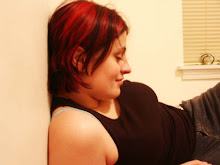The science world has been coming out with a lot of different studies about the biological differences between heterosexuals and homosexuals in an attempt to better understand how and why (biologically) homosexuality occurs in humans. Some of these studies include:
- Different brain sizes
- Sexually antagonistic selection
- Birth order
I think it is very important to study sexuality and not just homosexuality, but all types. However, there are also things one should keep in mind when reading or talking about these studies. Because while I think science can be a wonderful thing, it can also be subject to cultural and personal biases. Recently a strong intelligent feminist woman, Susan Skoog, put it very well in response to the article about different brain sizes (copied with her permission):
"There are some major problems with sexuality studies like this.
1. When neurologists try to determine once and for all the "innate" causes of sexuality, they don't realize the culturally-dependent framework they're using. That is, what do "gay" and "straight" mean to the researchers? How do they determine "gay" brains in the sample? By the self-reported preference of the subjects? By a survey of sexual behaviors over time? By their "deviance" from "straight" behavior? By their measured response to sexual stimuli?
All of these criteria are contingent upon subjective reflection and agreement upon terms (totally valid in the social sciences and in our personal sexual lives, but NOT in the realm of biological research.) For example, am I a lesbian if I have slept with women in the past year? The past 10 years? Or if I have never slept with one, but they turn me on? Or if (like the radicalesbians of the 1970s) I identify politically with women-loving-women? Who gets to say?
(referencing a point made earlier by someone else) I second the point about bisexuality. In every study I've read, bisexuality has been made invisible or given short shrift by being lumped into the study samples as "straight" or "gay" depending on the researcher. If bi means gay, we have a problem.
This philosophizing about "what is gay?" may at first seem like splitting hairs, but unless we can create objective operational definitions about sexual orientation, there's no way to do science about it.
Sexual tastes are not static entities-- everyone's sexuality develops and becomes enriched throughout life, and may even contradict itself. One person may go through many labels. To some people, their orientation has always been rock-solid. Others wrestle to develop/discover themselves more slowly. Still others refuse to define themselves at all. Are scientists going to look for the biological underpinnings of each of these?
Sexuality is much more than gender-choice; it's layered like an onion. Which is not to say that sexuality may be willfully changed either. I see no evidence to support anyone forcing themselves or others out of their sexuality.
2. Many of the brain studies (such as Simon LeVay's hypothalamic region study, and others' explorations of hormonal balances) sought to look for the ways in which male homosexuals' brains were "feminized." This confuses gender identity/expression with sexual preference and is dangerously unscientific.
3. Much of the sexuality research of the past 125 years has been focused on finding the biological quality separating gay people from everyone else. Straight brains are the controls in these studies--this is a big problem. When so little research has been performed on "straight" brains to find out how they tick sexually, how can we look at homosexuality without reducing it to an aberration from straightness? This reinforces the conception that all queerness is a flawed version of "normal" sexual response, as if there was such a thing.
I believe these sex researchers, for the most part, have good intentions, but their methods are inadequate, and their biases go unexamined. This is with the marked exception of the homophobic and transphobic Dr. Michael Bailey, who has stated publicly that if scientists could find the cause of homosexuality, he would strive to cure it."
Whether or not you agree with all of her points, it is important to keep each of them in mind when you read studies like these. Critical thinking is a much needed skill that many people seem to no longer employ when scientists or journalists start talking.
Tuesday, June 24, 2008
Studies of Homosexuality
Labels:
homosexuality,
news,
rant,
science
Subscribe to:
Post Comments (Atom)















No comments:
Post a Comment